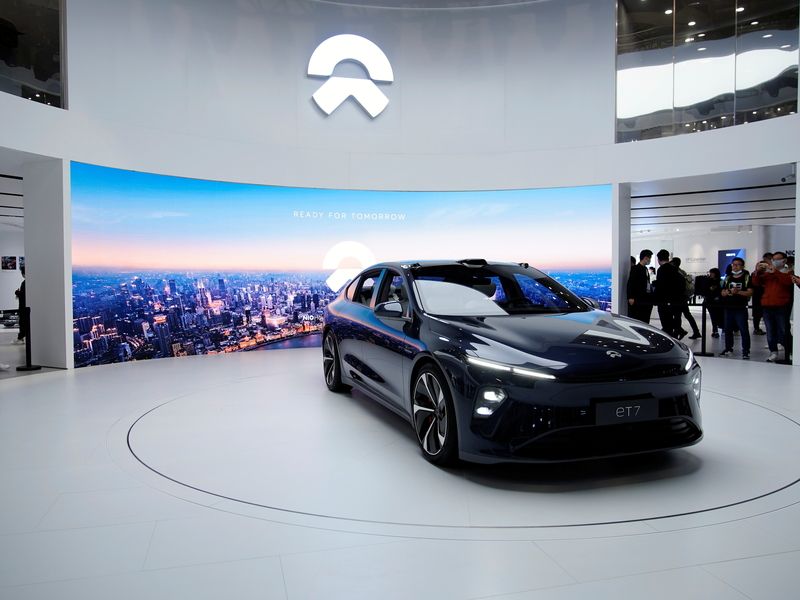
Shanghai electric vehicle startup Nio, taking a first major step to expand globally, will launch sales in Norway in September.
The first product to be marketed in the environmentally conscious market will be the ES8 SUV. It will be followed by the ET7 sedan sometime next year, Nio CEO William Li said at an event in Shanghai on Thursday. Preorders for the ES8 are expected to start soon.
“Launching in the European market will definitively help us grow,” Li said. It will set a “higher bar as we’re entering developed countries with more aggressive competition.”
Nio will establish a direct sales and service network in Norway, with the first local store to open in the Norwegian capital of Oslo in the third quarter. The company plans to build service centers in four local cities – Bergen, Stavanger, Trondheim and Kristiansand – in 2022.
It will also install battery-swapping stations in the five cities, with the first four to be operating before the end of the year.
Nio, incorporated in 2014, is China’s largest EV startup by sales. The New York Stock Exchange-listed company delivered 7,102 vehicles in April, a increase of 125 percent from a year earlier. As of April, its cumulative sales have reached 102,803.
In addition to the ES8, Nio has launched sales of the ES6 crossover and the EC6 coupe-like crossover. The ET7, its fourth product, is due to go on sale in China in the first quarter of 2022.
Choosing Norway as its European beachhead presents opportunities and challenges for Nio.
Norway last year became the first nation in the world to see EVs capture a majority of annual vehicle sales, a reflection of green-friendly government incentives and an extensive charging infrastructure.
The country wants all vehicles sold there to be zero-emission in 2025. However, little known outside China, Nio will be going up against more-established EVs such as Audi’s E-tron SUV, Tesla Inc.’s Model 3 sedan and Nissan Motor Co.’s Leaf hatchback.
Even traditional Chinese automakers, from Great Wall Motor Co. to Geely Automobile Holdings Ltd., have struggled to crack overseas markets, held back by a lack of name recognition, perceived question marks over quality and reliability and a dearth of dealer and service networks. Both Great Wall and Geely generated less than 10 percent of revenue outside their home market last year, according to information compiled by Bloomberg.
It’s also a risky move for a company that less than two years ago was on the brink of collapse before getting a funding lifeline from the Hefei municipal government. While Nio last week reported a narrower first-quarter loss, it’s facing stiff competition in China from rival startups Xpeng Inc. and Li Auto Inc., as well as new challenges from tech giants such as Baidu Inc. and Xiaomi Corp., which are pouring billions of dollars into EV investments.
Global automakers from BMW Group to Volkswagen Group are also rolling out new models to grab a bigger slice of the market.
Nio also is planning to bring its upmarket Nio Houses – a combination showroom, meeting space and cafe for auto enthusiasts – to Europe. Spending on the splashy club-like Nio Houses contributed to the cash burn that almost sank the company and had to be dialed back to preserve money.
The company has leased a 2,150-square-meter space spread in central Oslo for its first showroom and will have four smaller-sized Nio Spaces in Bergen, Stavanger, Trondheim and Kristiansand. Merchandise from the Nio Life line will arrive at some point.
Nio’s direct-sales model, supported by the planned service centers and mobile-service cars, in Norway is in contrast to other Chinese automakers that have opted to partner with local dealers.
Aichi Automobile has delivered more than 1,000 vehicles in Europe since making its first exports in May 2020, while Xpeng delivered 100 G3 SUVs to Norway in December, and has made a second shipment, a spokeswoman said, without giving specific details.
Nio will build four battery-swap stations in Norway this year with another 12 planned in 2022 across five cities. By constructing battery-swap stations, Nio is setting up the infrastructure for not only charging options but also its battery-as-a-service concept, whereby customers can buy a car and lease the battery. That makes for much lower upfront payments. Initially, battery-swap stations will be made in China and shipped to Europe, although over time, Nio may consider local production.
Beyond Norway, some analysts expect Europe to overtake China as the world’s biggest EV market this year. The region could account for 44 percent of global passenger EV sales in 2021, compared with 39 percent for China, according to BloombergNEF.
Li also said Nio one day plans to enter the U.S. market but doesn’t have a specific time frame. “Under the current international relations situation, it’s tougher for Chinese-background companies to enter overseas markets compared with years ago,” he said.
Like the rest of the auto industry, the company has been hit by the global chip shortage, suspending production for five days from late March to early April. It forecast deliveries of 21,000 to 22,000 cars this quarter because of “significant challenges” in the supply chain, Li said last week.
Bloomberg contributed to this report.

